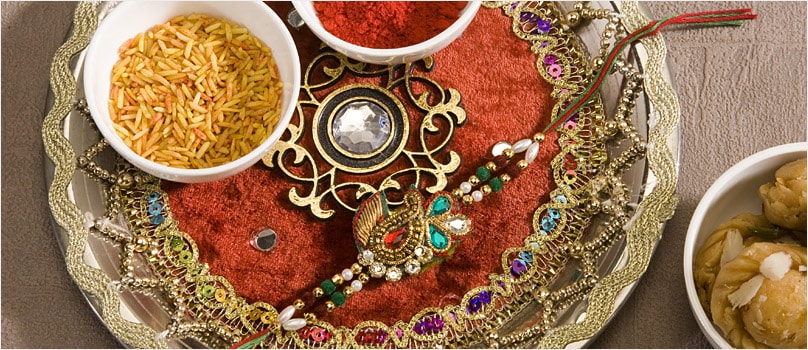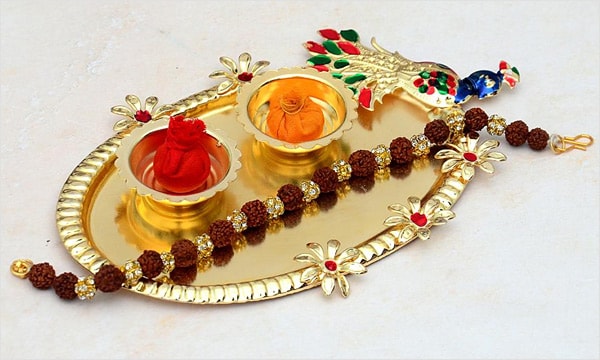
About Rakhi Festival
Rakhi is an ancient Indian festival that is being celebrated since the time immemorial. There are many myths and legends associated with Rakhi. We look forward to it as it is a time when the entire family gets down to have a fun filled day. The day is comprises of rituals which we follow in order to keep us up to the day with traditions.
Rakhi is time when the brothers and sisters have a nice day. The sisters tie rakhi around the wrist of their brothers and brothers showers them with gifts. If you are away from your dear brother, then you can now send rakhi to India. And if it is your sister who is awaiting you on the auspicious occasion of rakhi, then you can send rakhi gifts to India and make your presence felt, even you are miles away. Distances are no longer a thing of concern when your loved ones are happy and they remember you on the important occasion.

Myths & Legends around the festival of Rakhi
There are various myths and legends associated with Rakhi. I will show you the different myths associated with this festival
Myth about Sea God Varuna
According to one such concept, Rakhi is the means to worship the sea-god Varuna. Hence, we offer coconut to Varuna during this time in the western part of India. Here, the festival of Rakhi is becomes “Nariyal Poornima“. In other parts of India, we also call it “Rakhi Poornima” as we celebrate it on the day of the full moon of the Shravan month of the Hindu calender.
Rakhi Myth surrounding Yama
There is also another myth regarding this beautiful festival. According to another popular folklore, Yamuna observed Rakhi and its rituals for her brother Yama. This tradition is alive even in the 21st century when loved ones are far apart from each other by letting brothers and sisters send rakhi gifts to India on the special occasion of Rakhi.
Rakhi Myth surrounding Lord Indra
In the mythology, Guru Brihaspati suggested Lord Indra to wear a Rakhi on the the auspicious day of Shravan poornima to achieve success against the demons. Lord Indra eventually succeeded. Thus, rakhi also signifies the triumph of the good over the evil.
Legend of Rakhi in Mahabharata
Even in the great Indian epic, the Mahabharata, we find Krishna saving Draupadi’s honour against Kauravas like a brother as she treated him like her own. India’s rich cultural heritage played a significant role in shaping the traditions and Rakhi signifies that only.
Shishupal
Shishupal is Lord Krishna’s first cousin. Insolence is one of his characteristic. His energy was diametrically opposite to that of Krishna’s divine ways. The day after Yudhistara is crowned as the King of Indraprastha, it is decided that for the ensuing ceremonies Lord Krishna will be the chief guest.
Shishupala, who together with some of the greatest Kings of the time was also in court, challenged this. He was incensed with the idea of Krishna being the Chief Guest. Enraged he began character assassinating Krishna. He hurled expletives at Krishna and tried to demean him by calling him the cowherd who was not fit to be a Chief Guest. He arrogantly questioned the choice of Krishna as the Chief Guest when some of the greatest Kings of the land were in Court. Hearing this Bheema the second Pandav brother was furious. Younger brother Arjuna is similarly enraged. Bheeshma – the grand sire of the Pandav house, was aghast.
How Lord Krishna Warned Shishupal
But Krishna forbade them to intervene. He calmly let Shishupala know that he was counting his transgressions as he had promised Shishupala’s mother (Krishna’s Aunt) that he would forgive a hundred of the former’s wrong doings. But as soon as that number was crossed Shishupala would be punished. Accordingly when he crossed a hundred misdeeds Krishna unleashed his discus (the Sudarshan Chakra) at him which severed his head.
As the discus returned to Lord Krishna it cut his finger. While everyone in court was stupefied, Darupadi the Pandav Queen instantly rushed up to Lord Krishna, tore a strip from her sari and tied it around Krishna’s bleeding finger.
Krishna looked at her with utmost divine love promising her that he would honour each thread of her sari strip.
In time to come, when Draupadi’s shameful disrobing was attempted by her in-laws and she turned her entire attention to Krishna, it was He who made her robe unending. The Rakshabandhan that Draupadi tied became her divine armour. Grace became her divine protection.
Also Read :
6 Questions You Must Ask for Data Protection During Distance Learning





